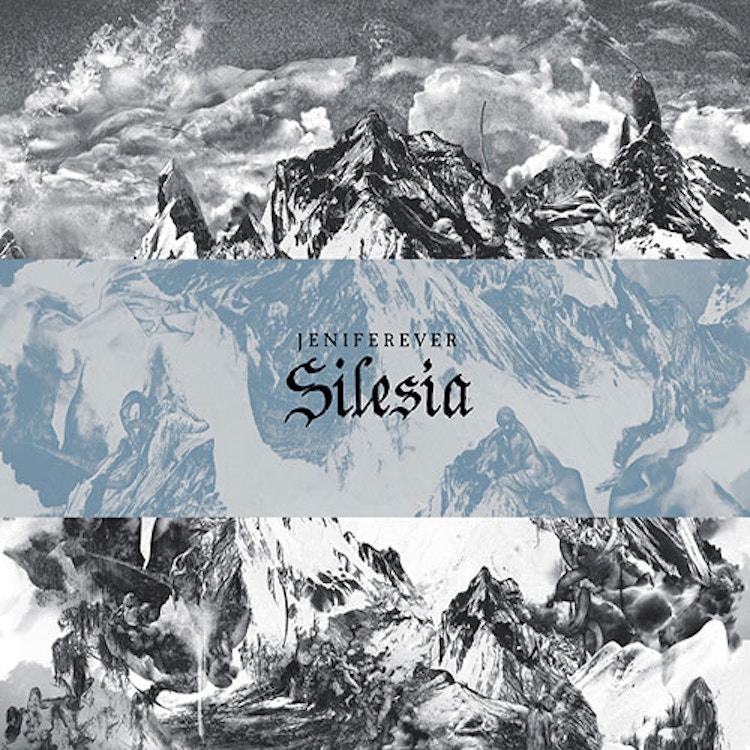"Silesia"

What comes to mind when you think about the current face of Sweden’s music scene? Perhaps it’s the powerful voices of Lykke Li and Robyn, or the more electronic offerings of The Knife and Fever Ray. You may think fondly of the likes of Peter Bjorn and John, The Radio Dept., Jens Lekman or, erm, Basshunter. Whichever particular talent is conjured up, it is unlikely that experimental four-piece Jeniferever would be the first act to spring to mind, yet the Swedish natives have assembled a cult following since their debut release in 2004, and rightfully so.
With the release of their third full-length Silesia, the band collectively confront front-man Kristofer Jönson’s recollected notions of personal tragedy and loss. Yet beside the trademark delicate intricacies and soft spasms of serenity there’s a new sense of urgency that flicker across many of their songs, placed alongside a previously unheard mainstream direction. Take lead single ‘Waifs & Strays’ and this renewed accessibility is instantly displayed, the repetitive, soaring guitar solo at the end of the song replacing the band’s hitherto preference for an atmospheric surge of orchestration. This newly acquired direction is also manifested in the upbeat offerings of ‘The Beat Of Our Own Blood’ and ‘A Drink To Remember’, both placed towards the album’s beginning and setting a tone that doesn’t differ hugely from their prior output, but certainly shows a sentiment of changeability.
It is only once in the midst of Silesia that Jeniferever’s previous mastery of richly textured, technical guitar work, chiming piano notes and ascending strings come back to the fore. Although Jeniferever have never been a post-rock band, there have always been touches of the genre within their music, particularly in their stretching passages of instrumental melodies, and as such there has always been a tendency for them to be classified in the post-rock category. In ‘Deception Pass’ Jeniferever proffer what is possibly the band’s heaviest track yet, and the closest they come to the description that oft defines them. Stripped of the repetitive atmospheric ambience of the rest of the tracks, ‘Deception Pass’ is also the shortest track on the album, and when placed right in the album’s centre serves as a signpost towards the band’s older, industrial elements. As with the likes of the sprawling soundscapes of ‘Nangijala’ from the band’s 2009 album Spring Tides each song is dreamily drawn-out and given substantial time to exhale and develop, such as with the beautiful ‘Cathedral Peak’ and the drone-soaked background of opening track ‘Silesia’, and as a result Jeniferever lose nothing of the sombre shoegaze sentimentality that has served them well thus far.
Taken as a whole entity – and when listened to alongside their back catalogue – Silesia is a more conventional output, certainly, but its constant serenity and sombre tones are probably not going to propel the band towards any dizzying heights of success. At least not yet, anyway. While Silesia is undoubtedly an altered creation compared with their older material, it doesn’t really overtly experiment or tread new water either. Yet what the album lacks in a slight absence of development is made up by Jeniferever’s sheer musical competence and construction, and the craft with which they compose and perform their tracks. Indeed there’s enough at work here to demonstrate that Jeniferever have got what it takes to push their way into people’s musical conscious, albeit in a delicate, slow-burning manner.
Despite much of the album’s deceptive tranquility, there is a constant shudder of driving drumming and occasional usage of synth-beats that keeps the momentum in check throughout. With much-needed repeated listens the lyrics and melodies slowly reveal themselves from beneath the cloaked and cryptic quietude that they hide behind as they battle against the rest of the album’s thundering instrumentation. Whether singing over a quiet piano, or five other instruments, Jönson’s vocal tone and volume appear to remain indistinguishable. Yet this isn’t due to his vocals being monotonous, or careless production, rather there’s a sense of melancholic meandering that permeates the entire record and as such the colliding sounds that encircle Jönson’s voice only serve to further demonstrate the unavoidable external elements that he laments throughout the release. And when the lyrics do reveal themselves they are worth waiting for.
Towards the end, Jeniferever’s new found accessibility resurges with ‘Dover’, yet is quashed once more with nine-minute closing track ‘Hearths’ and its final four-minute outro. Ultimately it is this ending sentiment of hazy silence that comes to define the entire record, and the band’s ocassional radio-friendly ventures are eventually trumped by the ambient touches that the band have continually cultivated throughout their career. Although Silesia won’t be the album that breaks Jeniferever into the more mainstream territory that they are perhaps striving for, it is an album that is certain to engage with and impress their existing admirers, as well as assuring that they collect a few more along the way. In the meantime Jeniferever’s inevitable, and hard-earned, success story is but only beginning.
Get the Best Fit take on the week in music direct to your inbox every Friday

Lorde
Virgin

OSKA
Refined Believer

Tropical F*ck Storm
Fairyland Codex





